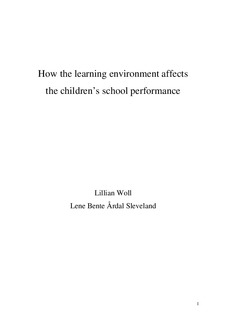| dc.contributor.author | Woll, Lillian | |
| dc.contributor.author | Sleveland, Lene Bente Årdal | |
| dc.date.accessioned | 2011-01-13T16:07:52Z | |
| dc.date.available | 2011-01-13T16:07:52Z | |
| dc.date.issued | 2010 | |
| dc.identifier.uri | http://hdl.handle.net/11250/183787 | |
| dc.description | Master's thesis in Economic analysis | en_US |
| dc.description.abstract | In this paper we estimate how the learning environment affects the children’s school
performance. Our learning environment determinant is the percentage of the child’s peers
having at least one parent with university education. In our regression we use Norwegian
register data of all graduating secondary pupils during the years 2002 to 2007 and their
parents.
The results in our main analysis, using the final assessments as the dependent variable,
indicate a negative peer effect of being in a good learning environment. This indicates that
children’s school performance gets poorer when the parents’ education level at school
increases. We carried out subsample analyses and controlled for school fixed effects in the
main analysis to explore what kind of mechanisms causing our negative results. The results
from the subsample analyses show that the well-performing pupils are more negatively
affected being in a good learning environment, and the subsample reveals that there probably
is no selection of well-performing pupils into schools. When controlling for school fixed
effects in the main analysis the estimates became close to zero. This indicates no peer effect.
The results suggest that the negative effect we found in the main analysis was due to school
specifics as for instance the school quality or the teachers’ grade setting.
To examine the school specifics more thorough we did an analysis using the examination
grades as the dependent variable. The results from this analysis revealed a positive peer effect.
This indicates that the teacher’s grade setting probably was the reason for our negative
estimates in the main analysis. We also controlled for school fixed effects in this analysis and
found no peer effect. This indicates that a child’s peers at school do not influence the child’s
own school performance. The learning environment, as we measure it, does not affect the
children`s school performance. | en_US |
| dc.language.iso | eng | en_US |
| dc.publisher | University of Stavanger, Norway | en_US |
| dc.relation.ispartofseries | Masteroppgave/UIS-SV-IØL/2010; | |
| dc.subject | økonomi | en_US |
| dc.subject | administrasjon | en_US |
| dc.subject | økonomisk analyse | en_US |
| dc.title | How the learning environment affects the children’s school performance | en_US |
| dc.type | Master thesis | en_US |
| dc.subject.nsi | VDP::Social science: 200::Economics: 210::Economics: 212 | en_US |
| dc.source.pagenumber | 59 p. | en_US |
